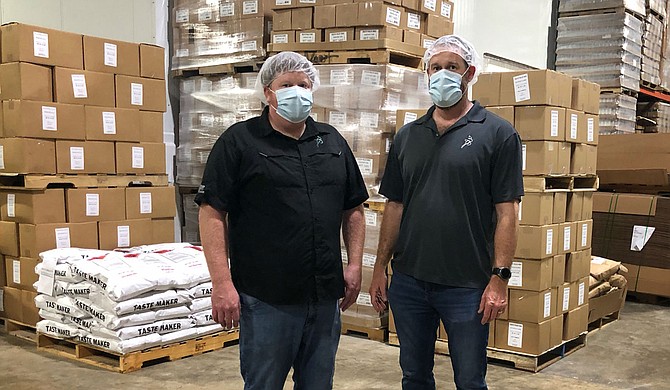Jeffrey Reed (left) and Justin Reed (right), sons of original owner R.J. Reed, presently own and operate their father’s spice- and sauce-blending business. Photo courtesy Reed Food Technology
Jeffrey Reed is part of the second generation of his family to own and operate Reed Food Technology. His father, R.J. Reed, started the spice-blending business in 1995. After Tyson Food bought out McCarty Food in Jackson, Tyson gave R.J. the opportunity to change his job description. He sold the company a few breading recipes that he had created and realized that he would like to become a vendor.
His business, Reed Food Technology, creates custom spice, sauce and other types of blends for its clients.
"(A customer) comes to us and tells us a dream they have," Jeffrey Reed says. "We do all the research, get the flavor profile the way the customer wants it, and we package it for them."
When the company began, it mainly sold seasonings in 50-pound bags and contracted with another business to do the blending. Since buying its own production facility in 1998, though, Reed Food Technology has been able to produce different packaging sizes, which opened the business to different segments of the market.
"We've got a lot of smaller, mom-and-pop-type operators all the way up to Fortune 500 companies," Reed says. "We've got a very diverse book of customers."
No matter the size of the client, Reed says that the company's job is to help grow businesses by producing their ideal flavor profiles—as determined in the initial consultation process.
Such a service is rare in Mississippi.
"We hear all the time—mainly from political people—that they don't know something like this exists in the state," Reed says. Though Reed remarks that there are other dry-blenders in the state, he says that his family's Pearl-based business sets itself apart by offering packaging for sauces, marinades, batters, breadings and more, and by allowing customers to fulfill their own vision for their products.
In the future, the owner would like to see Reed Food Technology's locations expand its ability to fulfill customer visions by offering hot-fill products, which have longer shelf-lives than other products. Reed noted that the process is complex, requiring appropriate equipment and "know-how."
"(Hot-filling) is putting the material in its final, elevated temperature in the package," he says. "It's difficult to do because there are drawbacks—it could continue to cook for hours or days inside the pallet. You have to find a way to reduce the temperature to stop the cooking process."
Reed Food Technology employs 56 workers at their metro location and an additional 35 at their site in north Mississippi, which specializes in flour mixes and is managed by Reed's brother, Justin Reed.
"We're able to offer our customers a wider breadth of products by having more than one category of products for restaurant operators," Jeffrey Reed says.
For more information, visit reedfood.com or call 601-939-4001.



Comments
Use the comment form below to begin a discussion about this content.
comments powered by Disqus